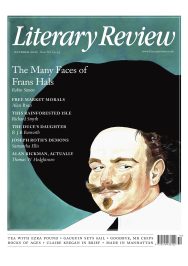Piers Brendon
Delusions of Grandeur
How Britain Broke the World: War, Greed and Blunders from Kosovo to Afghanistan, 1997–2022
By Arthur Snell
Canbury 416pp £25
Diplomats are masters of urbane doubletalk, so it is refreshing to find a former Foreign Office mandarin issuing a trenchant indictment of Britain’s deplorable geopolitical performance over the last twenty-five years. Arthur Snell held a senior post in the government’s anti-terrorist programme and now hosts a podcast named Doomsday Watch. In this book he argues that British post-imperial ambitions to ‘punch above our weight’ have significantly contributed to making the world more violent, dangerous and divided today than it has been at any time since the end of the Cold War.
Nothing caused more chaos than President George W Bush’s invasion of Iraq, ardently backed by Tony Blair in what Snell calls Britain’s ‘greatest act of global vandalism’. Its origins, he says, lay in the apparent success of NATO’s 1999 bombing campaign to prevent ‘ethnic cleansing’ in Kosovo. Britain and America averred that this was a humanitarian mission that did not need UN sanction, a novel doctrine which would pave the way for their unauthorised use of force in Iraq. Blair gloried in being the saviour of the Kosovans. The cheers and bouquets with which he was greeted on visiting Pristina reinforced his messianic faith in the virtue of ‘liberal interventionism’. So Blair kept his promise to support Bush after 9/11, regardless of the cost. And MI6, obedient to its master’s voice, fed the Americans dodgy intelligence about Saddam Hussein’s weapons of mass destruction in order to justify ‘regime change’.
The war resulted in hundreds of thousands of civilian deaths and a country culturally looted and economically devastated – today some seven million Iraqis are virtually destitute. The Middle East as a whole was destabilised and the power of Iran was enhanced, as it demonstrated by intervening in Syria. Meanwhile Putin, who accused the West of having anally raped Serbia, was prompted to foster aggressive nationalism in Russia, leading to a renewed assault on the breakaway republic of Chechnya and the ongoing invasion of Ukraine.
The British army took pride in its ability to counter insurgencies by winning hearts and minds, but in Basra it was, as General Petraeus said, ‘beaten in the field’. Britain’s actions in Afghanistan provided further examples of hubris and ineptitude: no account was taken of the anarchic conditions

Sign Up to our newsletter
Receive free articles, highlights from the archive, news, details of prizes, and much more.@Lit_Review
Follow Literary Review on Twitter
Twitter Feed
It wasn’t until 1825 that Pepys’s diary became available for the first time. How it was eventually decrypted and published is a story of subterfuge and duplicity.
Kate Loveman tells the tale.
Kate Loveman - Publishing Pepys
Kate Loveman: Publishing Pepys
literaryreview.co.uk
Arthur Christopher Benson was a pillar of the Edwardian establishment. He was supremely well connected. As his newly published diaries reveal, he was also riotously indiscreet.
Piers Brendon compares Benson’s journals to others from the 20th century.
Piers Brendon - Land of Dopes & Tories
Piers Brendon: Land of Dopes & Tories - The Benson Diaries: Selections from the Diary of Arthur Christopher Benson by Eamon Duffy & Ronald Hyam (edd)
literaryreview.co.uk
Of the siblings Gwen and Augustus John, it is Augustus who has commanded most attention from collectors and connoisseurs.
Was he really the finer artist, asks Tanya Harrod, or is it time Gwen emerged from her brother’s shadow?
Tanya Harrod - Cut from the Same Canvas
Tanya Harrod: Cut from the Same Canvas - Artists, Siblings, Visionaries: The Lives and Loves of Gwen and Augustus John by Judith Mackrell
literaryreview.co.uk